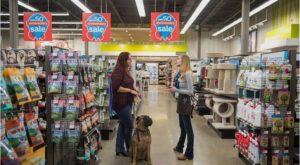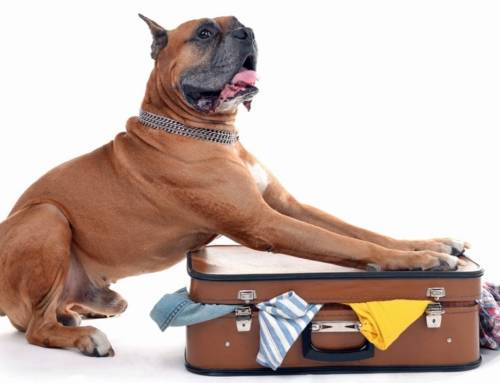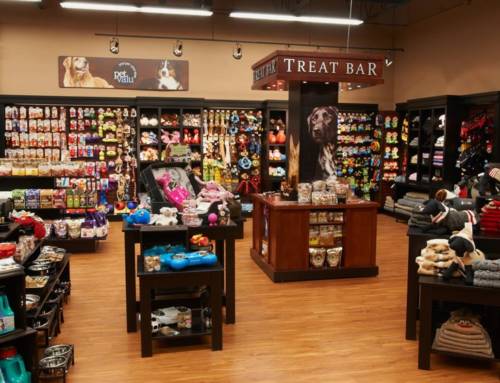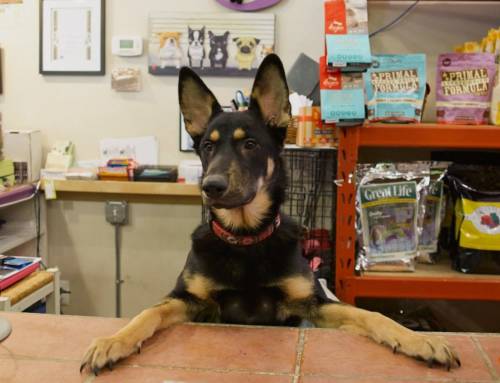Many pet owners are torn between convenient and affordable chain stores and small, locally-owned businesses. The decision is determined by a variety of factors, like budget, item, time limit, and resource availability. We know that big box stores are often the cheaper and more convenient option, but they are not the perfect choice for every purchase. Similarly, small, independently-owned shops have a more limited inventory, but this allows them to provide specialized products and services. As with most things pet-related, your choice in store will be determined by the type and quality of product you need. See below for our comprehensive guide.
Big Box Stores

Big box stores continue to dominate the pet supply market. Whether it’s through brick-and-mortar locations or online retail branches, most pet owners have visited a large chain pet supply store. These retail venues are known for their wide-reaching inventory and accessible prices—they carry everything from pet carriers and kennels to birdseed and aquarium decorations. If you need to pick up several unrelated pet supplies—for example: terrarium decorations, specialty bird food, and a cargo kennel water dish—you’ll be able to do all of your shopping at a single location.
Large inventories comprise just part of the benefit of shopping at a big box pet store. Large stores with a wide market reach are able to sell products at the lowest possible prices. Consistent and recurring sales further lower prices, allowing customers to save hundreds of dollars on large purchases. The e-Commerce pet industry is quickly changing this reality; buying online is becoming less expensive than shopping in a store. However, a big box store will almost always have lower prices than a small, independently-owned shop.
If you prioritize convenience and affordability, a large-scale pet store chain is your best option. However, big box stores have their own set of disadvantages. In most cases, a large-scale pet supply store will not provide the customer service necessary for big, important purchases, such as airline-approved carriers and kennels. The responsibility of research will fall to you, the customer. Pet store sales associates will understand their inventory, but if you’re trying to decide between two carriers when they have dozens of options, the attendant is unlikely to have the expertise necessary to advise. Similarly, if you want an item that is not in their inventory, ordering can be difficult.
Recap: Big box stores offer convenience and affordability through their large inventories, but they may not provide the customer service and flexibility necessary for important purchases.
Independent Pet Stores

The benefits of shopping at a small, independently-owned pet store rival those of big box stores, but they are necessarily different. When you shop local or independent, you sacrifice both convenience and affordability. Of course, there are still affordable boutique pet stores, but big box stores have a greater command of the market; they are able to offer supplies at the lowest prices available (aside from online retailers, who, without the burden of a brick-and-mortar storefront, can afford to slash costs even more). To that end, small, independently-owned pet stores are unlikely to have all the supplies you need. If you want to buy cat litter, dog treats, a bird cage, and a new aquarium filter in one trip, a big box store is likely the more convenient option.
That said, independent pet stores bring something significant to the table: an ability to follow market trends and understand their target buyers. A small size will allow these small businesses to follow market trends more closely, allowing them to quickly and easily phase out inventory in favor of new technology or trends. If you want the latest, trendiest pet supplies on the market, they’re more likely to be in your neighborhood pet store than at the large chain retailer off the highway.
Independent pet stores also possess a greater understanding of their target market. Though this greatly limits accessibility if you are not their target buyer (i.e. a cat owner shopping in a dog boutique), it improves the range and quality of supplies for specific customers. If you own a large tropical fish in Houston, there are dozens of independent stores available to provide resources and supplies. The big box store might not have the expertise necessary to coach you own that specific pet experience.
Shopping independent, regardless of industry, will nearly always result in a better customer service experience. Customers are able to communicate their likes, dislikes, and expectations for a product, and the sales associate will be able to point you in the right direction. Furthermore, if you would like to purchase a product but don’t see it on a small pet store’s shelves, talk to a sales associate; in most cases, they will be able to order it and potentially stock the item for future buyers. If you’re shopping at a big box store, you might have difficulty ordering an item if it is not in their inventory.
Recap: Independent pet stores lack convenience and affordability, but customer relations and an understanding of the target market and trends provide utility for specific demographics.
Conclusion
As with most shopping experience, the store you choose will depend on the type of product you need. If you’re only in the market for pet toys and a collar, you’ll find the trendiest products at your local, independently-owned pet store. If you need to stock up on food and litter, the big box store is likely the more convenient option. However, never write off the specificity of a small pet store. Who knows—you could have a neighborhood pet store devoted exclusively to cat litter.


